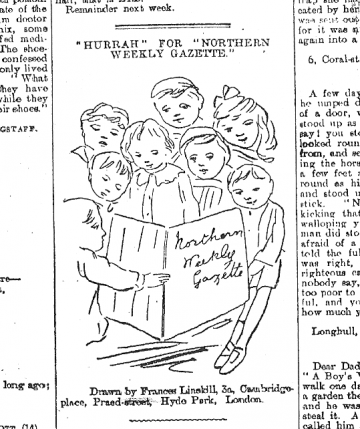My research seeks to understand children’s lives in late-nineteenth- and early-twentieth-century Britain. Most historians have studied childhood through the writing of adults. This is principally because the vast majority of evidence about childhood in the past is created by adults, either because they sought to prescribe what children ought to be like or because adults recalled what they remembered from when they were young fifty or sixty years earlier. But, these adult-authored sources offer us very partial and potentially inaccurate insights into what it meant to be a child. To try to learn more about what people really did, felt, and thought when they were still young, I started working on a research project using participatory children’s columns that were maintained in some weekly local newspapers, including the Manchester Weekly Times, between the 1870s and the 1930s.
The columns were partly the result of a revolution in working-class education across the nineteenth century. From 1870, schooling was made available to children across England. From 1880 attending school was made compulsory between the ages of 5 and 10, and in 1891 elementary education was made free. These legislative changes had a particular impact on the ability of poorer children and girls to access education, and, as a result, by 1900 almost all children were able to read and write. In the same way that young people today are often better at using computers and spend more time online than their parents or grandparents, these late nineteenth working-class children were more able to read and write than older generations. They were excited by these new literacy skills and journalists like ‘Uncle Oldman’ sought to attract this new group of young readers, writers and artists, who might persuade their parents to pay a penny for the newspaper every week. As a result of this transformation in the power and visibility of children, these decades are the earliest period in British history when we can learn what large numbers of ordinary children thought about their lives. You can listen to me talking more about these transformations here.
When I started working with these letters, poems, stories and pictures created by these literate child consumers, the ideas they expressed raised an important wider historical issue for me. When we think about how social change happens, we often assume that the whole population changed at the same time. These columns, however, show how powerful generational change can be in explaining how changes happens. The younger generation, born from the 1870s onwards, benefited from more education, had contrasting experiences, and expressed different values to their parents. I argue that many of the central changes in early twentieth century society were the result of this generational transformation in working-class childhoods. When they became adults in the early twentieth century, many argued for a more democratic political system, for the need for more social welfare and education, and for their rights to more money, space and time for leisure. Ernest, Ethel, Margaret, and Alfred were part of this generational change. The aspirations and expectations they expressed in adulthood were partly the result of their distinctive experiences in childhood.
At Oxford the research we do is closely linked to the courses we teach to undergraduates who study in the History Faculty. Two colleagues also work on later nineteenth century childhood, Christina de Bellaigue and Kathryn Gleadle, so we created a new course that explores these questions, called Becoming a Citizen, c.1860-1902. It is a Special Subject and the third-year students research an extended coursework essay and take an exam in which they make sense of these primary sources. These children’s letters are included in the set texts, so the final-year undergraduates may be asked questions on the same passages that you have been reading! Oxford’s History Faculty is also home to the UK’s only Centre for the History of Childhood. We organise seminars and events, so that undergraduate and especially graduate students, as well as Faculty members, can work together in thinking about children’s lives in the past and how we can best find out about them!




